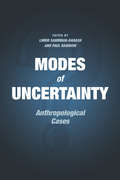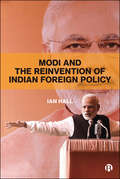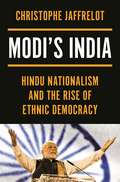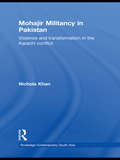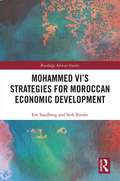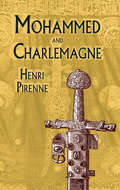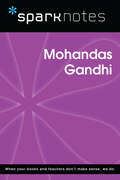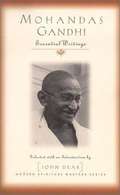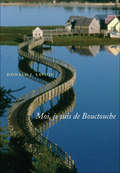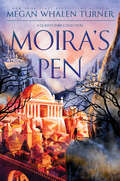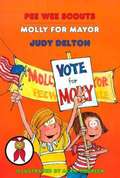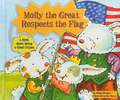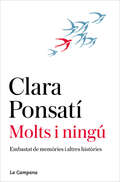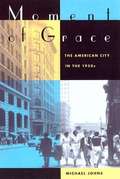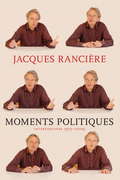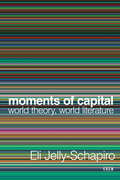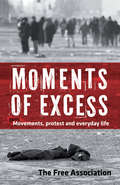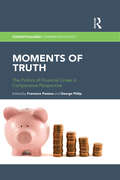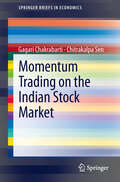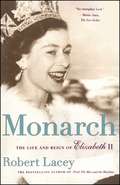- Table View
- List View
Modes of Uncertainty: Anthropological Cases
by Paul Rabinow Limor Samimian-Darah and Paul RabinowModes of Uncertainty offers groundbreaking ways of thinking about danger, risk, and uncertainty from an analytical and anthropological perspective. Our world, the contributors show, is increasingly populated by forms, practices, and events whose uncertainty cannot be reduced to risk—and thus it is vital to distinguish between the two. Drawing the lines between them, they argue that the study of uncertainty should not focus solely on the appearance of new risks and dangers—which no doubt abound—but also on how uncertainty itself should be defined, and what the implications might be for policy and government. Organizing contributions from various anthropological subfields—including economics, business, security, humanitarianism, health, and environment—Limor Samimian-Darash and Paul Rabinow offer new tools with which to consider uncertainty, its management, and the differing modes of subjectivity appropriate to it. Taking up policies and experiences as objects of research and analysis, the essays here seek a rigorous inquiry into a sound conceptualization of uncertainty in order to better confront contemporary problems. Ultimately, they open the way for a participatory anthropology that asks crucial questions about our contemporary state.
Modi and the Reinvention of Indian Foreign Policy
by Ian HallNarendra Modi’s energetic personal diplomacy and promise to make India a ‘leading power’, made soon after his landslide election victory in May 2014, surprised many analysts. Most had predicted that his government would concentrate on domestic issues, on the growth and development demanded by Indian voters, and that he lacked necessary experience in international relations. Instead, Modi’s time in office saw a concerted attempt to reinvent Indian foreign policy by replacing inherited understandings of its place in the world with one drawn largely from Hindu nationalist ideology. This book explores the drivers of this reinvention, arguing it arose from a combination of elite conviction and electoral calculation, and the impact it had on India’s international relations under Modi.
Modi's India: Hindu Nationalism and the Rise of Ethnic Democracy
by Christophe JaffrelotA riveting account of how a popularly elected leader has steered the world's largest democracy toward authoritarianism and intoleranceOver the past two decades, thanks to Narendra Modi, Hindu nationalism has been coupled with a form of national-populism that has ensured its success at the polls, first in Gujarat and then in India at large. Modi managed to seduce a substantial number of citizens by promising them development and polarizing the electorate along ethno-religious lines. Both facets of this national-populism found expression in a highly personalized political style as Modi related directly to the voters through all kinds of channels of communication in order to saturate the public space.Drawing on original interviews conducted across India, Christophe Jaffrelot shows how Modi's government has moved India toward a new form of democracy, an ethnic democracy that equates the majoritarian community with the nation and relegates Muslims and Christians to second-class citizens who are harassed by vigilante groups. He discusses how the promotion of Hindu nationalism has resulted in attacks against secularists, intellectuals, universities, and NGOs. Jaffrelot explains how the political system of India has acquired authoritarian features for other reasons, too. Eager to govern not only in New Delhi, but also in the states, the government has centralized power at the expense of federalism and undermined institutions that were part of the checks and balances, including India's Supreme Court.Modi's India is a sobering account of how a once-vibrant democracy can go wrong when a government backed by popular consent suppresses dissent while growing increasingly intolerant of ethnic and religious minorities.
Modus Vivendi Liberalism
by David MccabeA central task in contemporary political philosophy is to identify principles governing political life where citizens disagree deeply on important questions of value and, more generally, about the proper ends of life. The distinctively liberal response to this challenge insists that the state should as far as possible avoid relying on such contested issues in its basic structure and deliberations. David McCabe critically surveys influential defenses of the liberal solution and advocates modus vivendi liberalism as an alternative defense of the liberal state. Acknowledging that the modus vivendi approach does not provide the deep moral consensus that many liberals demand, he defends the liberal state as an acceptable compromise among citizens who will continue to see it as less than ideal. His book will interest a wide range of readers in political philosophy and political theory.
Moe Berg: The Spy Behind Home Plate (Fountas & Pinnell LLI Purple #Level W)
by John PerritanoThe Spy in a Baseball Cap. Moe Berg's story is the stuff of legend. He played professional baseball in the United States from 1923 to 1939 and was one of the game's more colorful characters. He also was an attorney who spoke at least ten different languages. But Berg had a secret, too--he was a spy for the U.S. government.
Mohajir Militancy in Pakistan: Violence and Transformation in the Karachi Conflict (Routledge Contemporary South Asia Series)
by Nichola KhanSynthesizing political, anthropological and psychological perspectives, this book addresses the everyday causes and appeal of long-term involvement in extreme political violence in urban Pakistan. Taking Pakistan’s ethno nationalist Mohajir party, the Muttahida Qaumi Movement (MQM) as a case study, it explores how certain men from the ethnic community of Mohajirs are recruited to the roles and statuses of political killers, and sustain violence as a primary social identity and lifestyle over a period of some years. By drawing on detailed fieldwork in areas involved in the Karachi conflict, the author contributes to understandings of violence, tracing the development of violent aspects of Mohajir nationalism via an exploration of political and cultural contexts of Pakistan’s history, and highlighting the repetitive homology of the conflict with the earlier violence of Partition. Through a local comparison of ethnic and religious militancy she also updates the current situation of social and cultural change in Karachi, which is dominantly framed in terms of Islamist radicalization and modernization. In her examination, governance and civil society issues are integrated with the political and psychological dimensions of mobilization processes and violence at micro-, meso- and macro- levels. This book injects a critical and innovative voice into the ongoing debates about the nature and meaning of radicalization and violence, as well as the specific implications it has for similar, contemporary conflicts in Pakistan and the developing world.
Mohamed Fekini and the Fight to Free Libya
by Antony Shugaar Angelo Del BocaThis book provides a significant history of Italy's brutal occupation of Libya. Using the lens of the life of the iconic resistance fighter Mohamed Fekini, it tells the story of Libya under Ottoman and Italian rule from the point of view of the colonized.
Mohammed VI's Strategies for Moroccan Economic Development (Routledge African Studies)
by Eve Sandberg Seth BinderThis book analyzes the economic development choices initiated by Morocco’s King Mohammed VI since he ascended the throne in 1999 and situates those choices in the political economy development literature. Examining the policies enacted by the King, the authors argue that over the past twenty years Mohammed VI has achieved some outstanding successes in modernizing the foundational economic sectors of Morocco, but the benefits of this development have not reached all Moroccans. With its focus on economic development, this book explores the way in which Mohammed VI’s development strategies have, in part, resembled the neoliberal model advocated by Western powers and institutions, as well as how the King also adopted some of the European practices of state intervention found in the "varieties of capitalism" models across Europe. Additionally, Mohammed VI’s Strategies for Moroccan Economic Development looks at the way in which the King has sought to utilize "leap frog" technologies so that Morocco has become a leader in certain productive sectors and is not just catching up to rival producers. The book also examines the extent to which Moroccan citizens have benefited from the economic transformations, arguing that not all Moroccans have benefited; many Moroccan citizens in 2019 echo the same economic concerns that were voiced in 1999 when King Mohammed VI first assumed the throne. With its focus on economic development, this book will be of interest not only to scholars and students of Middle East and North African Studies, but also Economics, International Development, and Politics.
Mohammed and Charlemagne
by Henri PirenneThe final work of the great Belgian historian Henri Pirenne, this remarkable classic — published after his death — offers a revolutionary perspective on how Europe under the influence of a Roman Empire centered in Constantinople evolved into the Europe of Charlemagne and the Middle Ages.Departing from the standard view that Germanic invasions obliterated the Roman Empire, Pirenne advances the radical new thesis that "the cause of the break with the tradition of antiquity was the rapid and unexpected advance of Islam," and event of historical proportions that prevented the western Mediterranean from being what it had always been: a thoroughfare of commerce and thought. It became instead what Pirenne refers to as "a Musulman lake," thereby causing "the axis of life [to shift] northwards from the Mediterranean" for the first time in history.
Mohandas Gandhi (SparkNotes Biography Guide)
by SparkNotesMohandas Gandhi (SparkNotes Biography Guide) Making the reading experience fun! SparkNotes Biography Guides examine the lives of historical luminaries, from Alexander the Great to Virginia Woolf. Each biography guide includes:An examination of the historical context in which the person lived A summary of the person&’s life and achievements A glossary of important terms, people, and events An in-depth look at the key epochs in the person&’s career Study questions and essay topics A review test Suggestions for further reading Whether you&’re a student of history or just a student cramming for a history exam, SparkNotes Biography guides are a reliable, thorough, and readable resource.
Mohandas Gandhi: Essential Writings (Modern Spiritual Masters Series)
by John Dear Mohandas GandhiMohandas Gandhi (1869-1948) is widely acknowledged as one of the great souls of the twentieth century. As the leader of the Indian independence movement he defined the modem practice of nonviolence, wedding an ethic of love to a practical method of social struggle. In the end, however, his philosophy was rooted in a deep spirituality. For Gandhi the struggle for peace and social justice was ultimately related to the search for God. These writings reveal the heart and soul of a man whose life and message bear special relevance to all spiritual seekers.
Moi, je suis de Bouctouche
by Donald SavoieDonald Savoie a grandi dans un petit village acadien et est devenu un auteur et un universitaire accompli. Ses livres ont eu un effet profond sur les politiques publiques du Canada et sur l'administration du pays. Moi, je suis de Bouctouche n'est pas seulement l'histoire de Savoie lui-même, mais aussi une histoire qui porte sur le Canada, le peuple acadien et l'évolution du Canada français.
Moi, je suis de Bouctouche: Les racines bien ancrées
by Donald J. SavoieDonald Savoie a grandi dans un petit village acadien et est devenu un auteur et un universitaire accompli. Ses livres ont eu un effet profond sur les politiques publiques du Canada et sur l'administration du pays. Moi, je suis de Bouctouche n'est pas seulement l'histoire de Savoie lui-même, mais aussi une histoire qui porte sur le Canada, le peuple acadien et l'évolution du Canada français.
Moira's Pen: A Queen's Thief Collection
by Megan Whalen TurnerJourney to the world of the Queen’s Thief in this beautifully illustrated collection, featuring bestselling and award-winning author Megan Whalen Turner’s charismatic and incorrigible thief, Eugenides. Discover and rediscover friends old and new, and explore the inspiration behind Megan Whalen Turner’s rich and original world. A stunning and collectible volume to return to again and again. This collectible companion to the New York Times–bestselling Queen’s Thief series is ideal for longtime fans, as well as readers discovering Megan Whalen Turner’s epic and unforgettable world for the first time. The collection includes all of the author’s previously published short fiction set in the world of the Queen’s Thief, as well as never-before-published stories, vignettes and excerpts, poetry and rhymes, a guide to objects from museums around the world that inspired the author, and a very special recipe for almond cake.The kings and queens of Eddis, Attolia, and Sounis all make unforgettable appearances, as do beloved and surprising characters from throughout the series and beyond. Meet Eugenides as a young boy in “Breia’s Earrings,” and Irene as a young princess in “The Princess and the Pastry Chef.” The six novels in the acclaimed and bestselling Queen’s Thief series are rich with political machinations, divine intervention, dangerous journeys, battles lost and won, power, passion, and deception. This collectible volume features illustrations and decorations throughout, illustrated endpapers, a stunning full-color jacket with embossed foil and gold stamping, a cast list, maps, and an introduction by the author.
Molecular Red
by Mckenzie WarkIn Molecular Red, McKenzie Wark creates philosophical tools for the Anthropocene, our new planetary epoch, in which human and natural forces are so entwined that the future of one determines that of the other. Wark explores the implications of Anthropocene through the story of two empires, the Soviet and then the American. The fall of the former prefigures that of the latter. From the ruins of these mighty histories, Wark salvages ideas to help us picture what kind of worlds collective labor might yet build. From the Russian revolution, Wark unearths the work of Alexander Bogdanov--Lenin's rival--as well as the great Proletkult writer and engineer Andrey Platonov.The Soviet experiment emerges from the past as an allegory for the new organizational challenges of our time. From deep within the Californian military-entertainment complex, Wark retrieves Donna Haraway's cyborg critique and science fiction writer Kim Stanley Robinson's Martian utopia as powerful resources for rethinking and remaking the world that climate change has wrought. Molecular Red proposes an alternative realism, where hope is found in what remains and endures.From the Hardcover edition.
Molly for Mayor (Pee Wee Scouts #39)
by Judy DeltonThe Pee Wees are running for office! In the imaginary town of Peeweeville, the Scouts will be mayor, police chief, and even dogcatcher. Molly thinks she would be a good mayor, but Roger thinks he should be mayor--and he offers candy to anyone who votes for him. How can Molly top that? Promising to do a good job just can't compete with free candy. Mary Beth has some ideas that are sure to get Molly noticed, but will it be the kind of attention Molly needs? May the best candidate win! The Pee Wees goof around, do good deeds, take on projects and have fun and adventures. Find out all about what scouts do in the other 38 Pee Wee Scout books you can get from Bookshare including: #1 Cookies and Crutches, #2 Camp Ghost-Away, #3 Lucky Dog Days, #4 Blue Skies, French Fries, #5 Grumpy Pumpkins, #6 Peanut-Butter Pilgrims, #7 A Pee Wee Christmas, #8 That Mushy Stuff, #9 Spring Sprouts, #10 The Pooped Troop, # 11 The Pee Wee Jubilee, #12 Bad, Bad, Bunnies, #13 Rosy Noses, Frozen Toes, #14 Sonny's Secret, #15 Sky Babies, #16 Trash Bash, # 17 Pee Wees On Parade, #18 Lights, Action, Land-ho!, # 19 Piles of Pets, #20 Fishy Wishes, #21 Pee Wees On skis, #22 Greedy Groundhogs, #23 All Dads on Deck, #24 Tricks and Treats, #25 Pee Wees on First, #26 Super Duper Pee Wees, #27 Teeny Weeny Zucchinis, #28 Eggs With Legs, #29 Pee Wee Pool Party, #30 Bookworm Buddies, #31 Moans and Groans and Dinosaur Bones, #32 Stage Frightened, #33 Halloween Helpers, #34 Planet Pee Wee, #35 Pedal Power, #36 Computer Clues # 37 Wild, Wild West, and #38 Here Come the Clowns.
Molly the Great Respects the Flag: A Book About Being a Good Citizen
by Shelley MarshallBeing a good citizen is when you pitch in. You help make the world a better place. Let's read!
Molts i ningú: Embastat de memòries i altres històries
by Clara PonsatíParla Clara: «Mentre ens hi deixem la pell continuarem sent catalans». «Qui, exiliant-se de la seva pàtria, ha fugit també d'ell mateix?», es preguntava Horaci. A Molts i ningú, Clara Ponsatí, lluny de fugir, es mira a ella mateixa i ens mira a nosaltres a la cara, i, amb la fermesa i la sinceritat que la caracteritzen, ens parla sense embuts. Aquest embastat de memòries i altres històries es pot llegir com una autobiografia: és la crònica d'una trajectòria vital i acadèmica molt rica i d'un compromís polític al llarg dels anys, i també el relat de primera mà d'un moment decisiu de la història recent -des del Primer d'Octubre fins al combat europeu dels exiliats- que convida a una reflexió de futur. Amb una evocació vivaç dels seus records familiars, l'autora converteix la narració del seu present, del seu passat i del de la seva família -començant pels besavis- en un autoretrat personal i col·lectiu, i ret un homenatge a la manera d'entendre, construir i viure aquest país de diverses generacions a través de la feina, la política, l'escola, la cultura i la llengua. «Si quan nosaltres tornem a casa Catalunya no és independent, haurem tornat, però no serem lliures. No som a l'exili pel que vam fer o pel que diuen que vam fer. Som a l'exili perquè som catalans i som independentistes. Mentre hi hagi independentistes, hi haurà repressió, exili i presó. Ha passat sempre. Per això és una enganyifa contraposar el diàleg a la independència. La història de Catalunya no es repeteix per casualitat. Es repeteix perquè no som lliures. No serveix de res ajornar la independència. No serveix de res cercar el nostre lloc a l'Estat espanyol. A l'Estat espanyol no hi tindrem mai lloc si no deixem de ser catalans. Ho han viscut els nostres avis, els nostres pares i ara ho estem vivint nosaltres. I ho viuran els nostres fills i els nostres nets si nosaltres ara defallim», escriu Clara Ponsatí en aquestes memòries.
Moment Of Grace: The American City In The 1950s
by Michael JohnsMoment of Grace tells the story of the American city in its remarkable heyday. Never before or after the 1950s were downtowns so exciting, neighborhoods so settled, or suburban dwellers so optimistic. Urban culture was at its peak: it was vital, urbane, conformist, and generating rebellion all at once. Capturing the mood of the '50s in superb historical photographs and mining delightfully varied sources—including urban critics, interviews with city residents, novels, songs, magazines, and newspapers—Moment of Grace brings alive the downtowns, the neighborhoods, and the suburbs of the era. A rich historical reflection on a singular decade, the book also portrays the '50s as a critical turning point in American culture and economy. Michael Johns shows us exactly why city life never could or would be the same again. Giving a vivid sense of the lived experience of the day, Johns explores the '50s in cities such as New York, San Francisco, Philadelphia, Chicago, and Oakland, writing about fashion (which demanded the highest heels and pointiest breasts in history), nightlife, architecture, literature, business and economic trends, and teenage culture. He tells us what was for sale in the stores, who lived in the neighborhoods, what life was like for women in the brand-new suburbs, and much more. And he confronts difficult issues head-on. What did the loss of city jobs and the simultaneous success of the civil rights movement mean for black neighborhoods? What were the profound consequences of the rise of the suburbs for family life? In contrast to the vibrant cities of the '50s, the streets of today's downtowns are often empty if not suffused with melancholy. Johns uncovers the seeds of the transformation from the '50s to today, and at the same time, he paints a memorable picture of the American past.
Moments Politiques
by Jacques Ranciere Mary FosterHow do we define politics? What is our role in the unfolding of the political?Moments Politiques finds Jacques Rancière, the legendary French philosopher, addressing these questions in essays and interviews drawn from thirty years of passionate public discourse. Reflecting on events from the Paris uprisings of May 1968 to the near present, and on his contemporaries including Michel Foucault, Guy Debord, and Roland Barthes, Rancière interrogates our understanding of equality, democracy, and the shifting definition of communism today.In these short, provocative, accessible pieces, we are asked to imagine a society where the "anarchic bedrock of the political" is precisely "the power of anyone." This is a world of radical equality. It is a place where the student or factory worker's opinion is equal to that of any banker or politician. To support these ideas, key concepts of Rancière's political thought are introduced, such as his notions of dissensus and political performance, and his special definition of "police." Moments Politiques stages unflinching confrontations with immigration law, new waves of racism, and contemporary forms of intervention. As ever, Rancière leads by example and breathes life into his argument that "dissent is what makes society liveable."From the Trade Paperback edition.
Moments of Capital: World Theory, World Literature (Currencies: New Thinking for Financial Times)
by Eli Jelly-SchapiroUndertaken at the interface of critical theory and world literature, Moments of Capital sets out to grasp the unity and heterogeneity of global capital in the postcolonial present. Eli Jelly-Schapiro argues that global capital is composed of three synchronous moments: primitive accumulation, expanded reproduction, and the "synthetic dispossession" facilitated by financialization and privatization. These moments correspond to distinct economic and political forms, and distinct strands of theory and fiction. Moments of Capital integrates various intellectual traditions—from multiple trajectories of Marxist thought, to Weberian inquiries into the "spirit" of capitalism, to anticolonial accounts of racial depredation—to reveal the concurrent interrelation of the three moments of capital. The book's literary readings, meanwhile, make vivid the uneven texture and experience of capitalist modernity at large. Analyzing formally and thematically diverse novels—works by Fiston Mwanza Mujila, Marlon James, Jennifer Egan, Eugene Lim, Rafael Chirbes, Neel Mukherjee, Rachel Kushner, and others—Jelly-Schapiro evinces the different patterns of feeling and consciousness that register, and hypothesize a way beyond, the contradictions of capital. This book develops a new conceptual key for the mapping of contemporary theory, world literature, and global capital itself.
Moments of Excess: Movements, Protest and Everyday Life
by The Free AssociationExamining the complicated and sometimes controversial history, goals, and tactics of anticapitalist movements, this compilation focuses on the meaning of the movement as a whole and examines the protests that surrounded global trade and political conferences such as the 1999 World Trade Organization meetings in Seattle and the ongoing G8 summits around the world. The collection offers a broad vision of anticapitalist activism as well as strategies for instigating change, not only for the individual, but also for the collective. Featuring popular culture references, humor, poetry, and essays, this analysis of the counter-summit movement is ideal for those wanting to explore new possibilities for mobilization in the midst of crisis.
Moments of Truth: The Politics of Financial Crises in Comparative Perspective (Conceptualising Comparative Politics)
by George Philip Francisco PanizzaThe current financial and sovereign debt crisis of the European Union and the United States can be regarded as the most recent of a wave of financial and sovereign debt crises that have affected different regions of the world over the past quarter century. While there is a large and growing body of literature on the economic aspects of financial crises, its political elements remain surprisingly under-studied. Moments of Truth: The Politics of Financial Crises in Comparative Perspective fills this gap in the literature by looking at the political repercussions and policy implications of financial crises in comparative perspective, using case studies in Latin America, Korea, and Russia, as well as the contemporary crises in the US and in key European countries. Contributors to this volume look at the crises as critical junctures that generate high levels of uncertainty while calling for decisive action. The chapters emphasize structural or agency based explanations and give relevance to the role of ideas, interests, and institutions in explaining different outcomes. The questions addressed by the case studies include: how the crises were defined by key actors, the range of political and policy options available to deal with their impact, the role of ideas in policy shifts, how political and economic actors redefine their interests in contexts of uncertainty, how political institutions mediate reactions to the crises, what explains the choice of a certain option over other alternatives, and whether the crisis has (so far) resulted in significant political and policy changes or in incremental adjustments to the status quo. The first book to comparatively analyze the political dimensions of financial crises across different global regions, Moments of Truth will be highly significant for any scholars interested in the contemporary debate on financial crises.
Momentum Trading on the Indian Stock Market
by Chitrakalpa Sen Gagari ChakrabartiThis study is an exploration of the Indian stock market, focusing on the possible presence of momentum trading. One thing, however, should be noted. While it is true that momentum trading, which tends to generate speculative bubbles, may result in a financial market crash, its nature in contrast might depend on the nature of the economy itself. The study, while exploring the presence and nature of momentum trading on the Indian stock market in recent years, seeks to relate it to significant structural breaks in the Indian or global economy. To be precise, it outlines a potential correlation between the instability in the stock market and the speculative trading on the market, exploring the question of whether it is human psychology that drives financial markets. In the process, the choice of a significant structural break has been obvious: the global financial meltdown of 2007-2008 - a crisis that has often been referred to as the worst ever since the crash of 1929. While analyzing the nature of momentum trading on the Indian stock market with regard to the financial crisis of 2007-08, the study takes into account two major representatives of the market, the BSE (Bombay Stock Index) and NSE (National Stock Index), for the period 2005 to 2012. This study seeks to answer a few important questions. First of all, it tries to unveil the underlying structure of the market. In doing so, it examines the following issues: (i) What was the latent structure of the Indian stock market leading up to the crisis of 2007-08? Does the structure offer insights into designing profitable trading strategies? (ii) Is it possible to construct a profitable portfolio on the Indian stock market? (iii) Is there any profitable trading strategy on the Indian stock market? While exploring these issues, the study delves deeper, breaking the whole period down into two sub-periods, before the crisis of 2008 and after the crisis. The purpose of this division is to determine whether there has been any discernible change in the market structure since the shock.
Monarch: The Life and Reign of Elizabeth II
by Robert LaceyFor more than fifty years, Elizabeth Alexandra Mary Windsor-- who became Elizabeth II, Queen of England on February 6, 1952-- has been loved and loathed, revered and feared, applauded and criticized by her people. till she endures as a captivating figure in the world's most durable symbol of political authority: the British monarchy. In Monarch, a meticulously detailed portrait of Elizabeth II as both a human being and an institution, bestselling author Robert Lacey brings the queen to life as never before: as baby "Lilibet" learning to wave to a crowd in the Royal Mews; as a child "ardently praying for a brother" so as to avoid her fate; as a young woman falling in love with and marrying her cousin Philip; and as the mother-in-law of the most complicated royal of all, Princess Diana. Updated with new material to reflect the 2002 Golden Jubilee and the passing of the Queen Mum -- and featuring dozens of photographs, a family tree of the Hanoverian-Windsor-Mountbatten families, and a map that charts the location of royal castles-- Monarch is an engaging, critical, and celebratory account of Elizabeth's half-century reign that no reader of popular history should be without.
